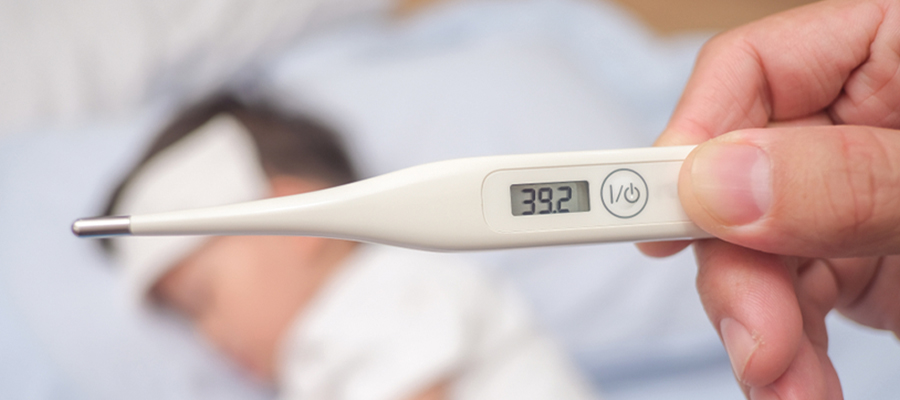
Estimated reading time: 4 minutes and 59 seconds
Fever
Comprehensive Fever Treatment at Aktif International Hospitals
Fever is a common symptom characterized by an elevated body temperature, often indicating an underlying infection or inflammatory response in the body. While fever itself is not a disease, it is usually a sign that the body is fighting off an infection or illness. At Aktif International Hospitals, we offer comprehensive fever treatment services to accurately diagnose the underlying cause of fever, provide appropriate medical interventions, and ensure optimal care for our patients.
Frequently Asked Questions
What is fever, and why does it occur?
Fever is defined as an elevation in body temperature above the normal range, typically considered to be 98.6°F (37°C). Fever occurs as a result of the body’s natural response to infection, illness, or other physiological triggers. When the body detects a foreign invader, such as bacteria, viruses, or toxins, it releases chemicals called pyrogens, which act on the hypothalamus in the brain to raise the body’s temperature set point, resulting in fever. Fever is a protective mechanism that helps the body fight off infections by stimulating the immune system and inhibiting the growth and replication of pathogens.
Who is at risk of developing fever?
Anyone can develop a fever in response to infection, illness, or other triggers. However, certain factors may increase the risk of fever, including:
- Young children: Infants and young children are more susceptible to fever due to their developing immune systems and frequent exposure to infections in daycare or school settings.
- Older adults: Older adults may be more vulnerable to fever due to age-related changes in immune function and underlying health conditions that can compromise immune responses.
- Individuals with weakened immune systems: People with weakened immune systems, such as those with chronic medical conditions (e.g., diabetes, HIV/AIDS) or undergoing immunosuppressive therapy (e.g., chemotherapy, organ transplantation), may be at increased risk of developing fever and complications from infections.
What are the common causes of fever?
Fever can be caused by a wide range of underlying conditions, including:
- Infections: Such as viral infections (e.g., influenza, common cold, COVID-19), bacterial infections (e.g., urinary tract infection, pneumonia, strep throat), fungal infections (e.g., candidiasis), or parasitic infections (e.g., malaria).
- Inflammatory conditions: Such as autoimmune diseases (e.g., rheumatoid arthritis, lupus), inflammatory bowel disease (e.g., Crohn’s disease, ulcerative colitis), or vasculitis.
- Medications: Some medications or drug reactions may cause fever as a side effect, such as antibiotics, anticonvulsants, or nonsteroidal anti-inflammatory drugs (NSAIDs).
- Heat-related conditions: Heat exhaustion or heatstroke can lead to fever in response to prolonged exposure to high temperatures or strenuous physical activity.
- Cancer: Some types of cancer, such as leukemia, lymphoma, or solid tumors, may cause fever as a result of tumor-related inflammation or immune system activation.
What are the symptoms of fever?
In addition to an elevated body temperature, fever may be accompanied by other symptoms, depending on the underlying cause, including:
- Chills or sweating
- Headache
- Muscle aches or joint pain
- Fatigue or weakness
- Loss of appetite
- Irritability or restlessness
- Dehydration
- Respiratory symptoms (e.g., cough, sore throat, difficulty breathing)
- Gastrointestinal symptoms (e.g., nausea, vomiting, diarrhea)
How is fever diagnosed and treated?
The diagnosis and treatment of fever depend on identifying the underlying cause and addressing any associated symptoms or complications. Diagnostic tests may include:
- Physical examination: The healthcare provider will assess the patient’s vital signs, symptoms, medical history, and risk factors to determine the likely cause of fever.
- Laboratory tests: Blood tests, urine tests, throat swabs, or other diagnostic tests may be performed to identify the presence of infection, inflammation, or other abnormalities.
- Imaging studies: In some cases, imaging tests such as chest X-rays, CT scans, or ultrasound may be ordered to evaluate the internal organs and identify any signs of infection or other underlying conditions.
Treatment for fever aims to:
- Reduce fever: Over-the-counter medications such as acetaminophen (Tylenol) or ibuprofen (Advil, Motrin) may be used to lower fever and alleviate discomfort. It is important to follow the recommended dosage instructions and consult a healthcare provider before giving medications to children or individuals with certain medical conditions.
- Address underlying cause: Treatment may involve antibiotics, antiviral medications, antifungal drugs, or other specific therapies to target the underlying infection or condition causing fever.
- Manage symptoms: Additional treatments such as fluids, rest, humidifiers, or throat lozenges may be recommended to relieve symptoms such as dehydration, cough, sore throat, or nasal congestion.
When should I seek medical attention for fever?
While most cases of fever are mild and resolve on their own without medical intervention, it is important to seek prompt medical attention if you experience:
- High fever (above 103°F or 39.4°C)
- Persistent fever lasting more than three days
- Fever accompanied by severe symptoms such as difficulty breathing, chest pain, confusion, or seizures
- Fever in infants under three months of age
- Fever in individuals with weakened immune systems or underlying health conditions
Trust Aktif International Hospitals for Comprehensive Fever Treatment
At Aktif International Hospitals, we understand the importance of timely and accurate diagnosis and treatment of fever to ensure optimal outcomes for our patients. Our team of experienced healthcare providers specializes in infectious diseases, internal medicine, pediatrics, and emergency medicine and offers comprehensive fever treatment services tailored to your individual needs and concerns. Whether you require diagnostic testing, medication therapy, or supportive care for fever, you can trust Aktif International Hospitals to deliver high-quality, compassionate care to help you recover and regain your health. Schedule your consultation with us today and experience the difference at Aktif International Hospitals.
Author: İsmet Önder


 TR
TR FR
FR ES
ES RU
RU RO
RO